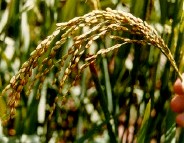|
afrol News, 6 June - As Western Africa sees the introduction of new rice varieties that could revolutionise staple harvests, the pioneers are not selected casually; most are women, the backbone of small-scale farming in the region. The NERICA (New Rice for Africa) varieties are now massively introduced to farmers in Côte d'Ivoire. West Africa has about 20 million rice farmers, and most of them are women. The typical rice farmer has about one hectare of rice fields, which she or he only can use for a few years before weeds take control and soil fertility has degraded too much. Then, new land must be cleared for the low-yielding but principal food staple of the region. An Ivorian rice farmer has until now had the difficult choice between the traditional African varieties - low-yielding but resistant to weeds, pests and droughts and adapted to acid upland soils - or the higher yielding Asian species, which are poorly adapted to the African environment. Poor households - the majority - can only afford to plant Asian rice to produce enough to feed their family and sell surplus grain. The NERICA varieties, developed in the 1990s by the West Africa Rice Development Association (WARDA) - based near Bouaké, Côte d'Ivoire - combine the best qualities of African and Asian species. They can yield up to 50 per cent larger crops without fertiliser than varieties now grown, produce up to twice the yield with fertiliser and improved management, and are substantially richer in protein. Because of their high productivity, it is estimated that NERICAs will save West and Central African countries US$ 88 million in rice imports by 2005. WARDA is investing more than US$ 15 million over the next five years to spread the new rice among farmers in seven pilot countries, focusing on small-scale and women farmers. The countries include Benin, Côte d'Ivoire, The Gambia, Guinea, Mali, Nigeria and Togo. The initiative will also promote the rice in another 18 countries across the sub-continent. NERICA rices may even help farmers who grow upland rice on 17 million ha in Asia and 4 million ha in Latin America. In Côte d'Ivoire, Prime Minister Pascal Affi N'Guéssan launched the initiative in a March ceremony in the capital, Yamoussoukro. Ivorian President Laurent Gbagbo, officials from neighbouring countries, NGOs and farmers were present at the ceremony.
According to reports from the UN development agency UNDP, the NERICA varieties have already been well received among Ivorian female rice farmers. "The NERICA varieties mean quick money because they mature early," Digbeu Ori Elise, a woman farmer from Saioua in central Côte d'Ivoire, told UNDP. "That means a lot because I have six children, and all are in school." In addition to higher and earlier yields, the varieties also have another direct impact on female farmers. Weeding traditionally accounts for 30 to 40 percent of all labour - mostly by women and children - invested in a West African rice crop. The new varieties compete significantly better with weeds, reducing the back-breaking work. The new rices are also taller than other varieties, which makes harvesting easier - especially for women with babies strapped to their backs. Kpassa Albertine, a woman farmer from Zaguiguia, in western Côte d'Ivoire, told the UN agency that farmers in her community sowed many rice varieties, but during last year's drought "only the NERICAs would grow." Now all the farmers in the Daloa region want to grow the NERICAs, but not enough seeds are available - a problem the initiative is addressing. WARDA's initiative aims to make NERICAs available "as quickly and widely as possible through a participatory, community-based seed production strategy that will train farmers to grow seeds for other farmers and make a profit from it." Local farmers will also work closely with scientists in tailoring new varieties to suit their needs. The priority for the first two years will be dry upland areas where farmers grow rice without irrigation, depending only on rain, and where severe poverty and malnutrition are widespread. The initiative will introduce multiple varieties, letting farmers choose those that suit their needs, and will also promote complementary technologies to boost soil fertility and improve nutrition among farm families. Market access will also be a focus to promote the sale of harvested rice, UNDP reports. Similar projects are being carried out in several West African countries. In Guinea, the programme started already in 1998, where more than 1300 farmers participated in a program. Average farm yields were "rising from about 1 tonne to more than 1.5 tonnes per hectare with low
inputs - and at least double that with good management and intermediate inputs," WARDA reported from Guinea. Sources: Based on Warda, UNDP and
afrol archives
|
front page
| news
| countries
| archive
| currencies
| news alerts login
| about afrol News
| contact
| advertise
| español
©
afrol News.
Reproducing or buying afrol News' articles.
You can contact us at mail@afrol.com

